Marketing is the strategic process of promoting products or services to target audiences to drive awareness, engagement, and sales. It involves various activities such as market research, brand development, advertising, and customer relationship management.
Effective marketing connects businesses with their customers, helping them communicate value, build brand loyalty, and maintain a competitive edge in the marketplace. From traditional advertising campaigns to digital strategies and content creation, marketing is crucial in helping businesses achieve growth and sustainability.
Marketing consulting takes this one step further by offering specialized expertise to help businesses optimize their marketing efforts.
A marketing consultant is typically an experienced professional who helps companies develop, execute, and refine their marketing strategies. Whether it’s helping a business refine its branding, launch a new product, or navigate digital marketing trends, consultants provide tailored solutions to enhance marketing performance and return on investment.
In this article, we will explore 10 creative consulting ideas that marketing service providers can offer to generate revenue, build client relationships, and enhance business growth. By leveraging platforms like Minutly’s service catalog, marketing consultants can effectively showcase their services and attract new clients in a competitive market.
Fractional CMO as a Service
In today’s fast-paced and competitive business environment, many companies require high-level marketing leadership but may not have the budget or need for a full-time Chief Marketing Officer (CMO). This is where a Fractional CMO (Chief Marketing Officer) as a Service becomes invaluable. A Fractional CMO provides companies with access to senior marketing expertise on a part-time or project-based basis, allowing businesses to benefit from strategic guidance without the commitment or cost of a full-time hire.
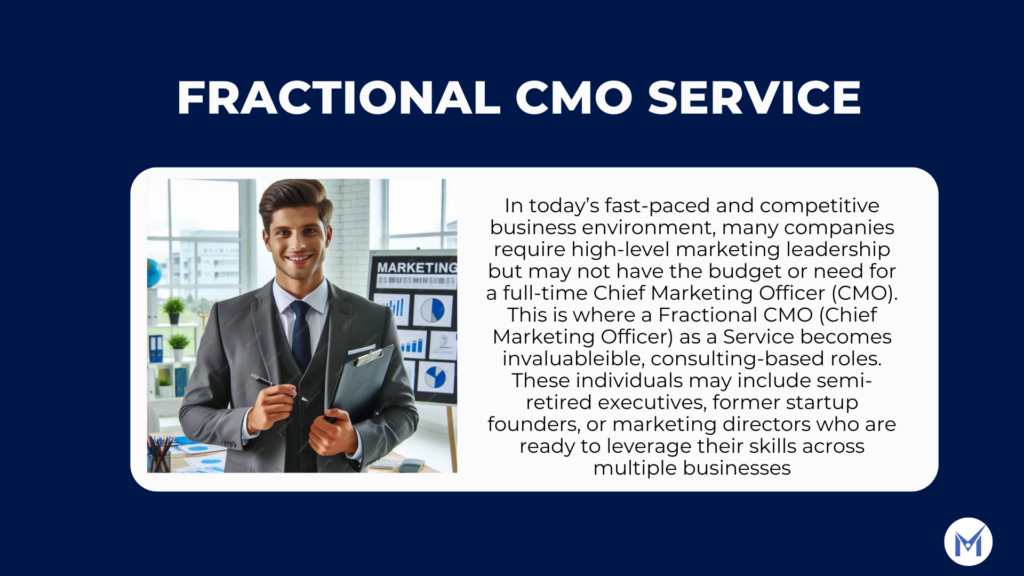
This service is particularly beneficial for startups, SMBs, or companies undergoing major transformations.
The roles and responsibilities of a fractional CMO mirror those of a full-time CMO but on a reduced or temporary scale. Fractional CMOs are responsible for developing marketing strategies, overseeing brand positioning, managing marketing teams, and aligning marketing efforts with business objectives.
They may lead initiatives in digital marketing, content strategy, lead generation, and customer acquisition. For example, a tech startup looking to scale its product might hire a fractional CMO to refine its go-to-market strategy, oversee a product launch, and drive initial customer acquisition efforts.
For businesses in a growth phase, a fractional CMO can ensure marketing efforts are aligned with scaling objectives, helping to attract new customers, retain existing ones, and improve overall brand presence
Typically, Fractional CMO engagements involve working with a client for 2 to 3 days per week over a 3 to 6-month period, with fees ranging from $8,000 to $20,000 per month, depending on the company’s needs and the scope of the role.
The deliverables for this service often include a detailed marketing strategy, a revamped brand positioning, a tactical plan for execution, and performance metrics to track success.
A fractional CMO service is a win-win for both companies and consultants—businesses gain flexible, expert marketing leadership, and service providers have the opportunity to expand their consulting practices across multiple industries.
Market Research and Competitive Analysis
For marketing to work, it is critical to understand the market and its competition.
Market research involves gathering data on customer behaviors, preferences, and market trends to understand what drives demand. This helps businesses identify opportunities and challenges in the market, enabling them to tailor their offerings to meet customer needs. For instance, Netflix’s decision to shift from DVD rentals to streaming was driven by market research identifying a growing demand for on-demand video.
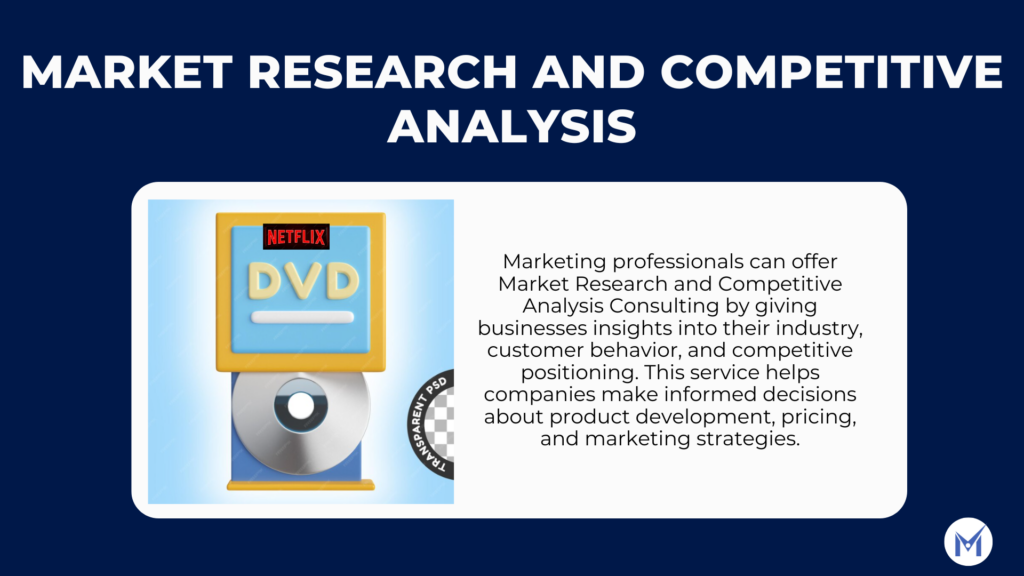
Competitive analysis, on the other hand, involves examining the strengths and weaknesses of competitors to find ways to differentiate the brand and capitalize on market gaps.
Competitive analysis, on the other hand, involves examining the strengths and weaknesses of competitors to find ways to differentiate the brand and capitalize on market gaps.
Both market research and competitive analysis are essential components of a marketing strategy because they provide a data-driven foundation for decision-making.
By thoroughly understanding the market landscape and competition, businesses can craft strategies that set them apart and resonate more effectively with their target audience
Marketing professionals can offer Market Research and Competitive Analysis Consulting by giving businesses insights into their industry, customer behavior, and competitive positioning. This service helps companies make informed decisions about product development, pricing, and marketing strategies.
A Market Research and Competitive Analysis Service typically spans 4 to 6 weeks with costs ranging from $10,000 to $25,000. Deliverables include a comprehensive market analysis report, competitor benchmarking, and actionable insights to improve market positioning. This service provides businesses with the data they need to make strategic decisions and remain competitive in their industry.
Go-to-Market (GTM) Consulting Service
A Go-to-Market (GTM) strategy is a comprehensive plan that outlines how a company will introduce its product or service to the market and achieve competitive advantage. GTM strategies detail the target audience, value proposition, marketing and sales tactics, distribution channels, and pricing models, among other components. For companies, particularly startups, a well-defined GTM strategy is essential for launching successfully and gaining traction in the market. An effective GTM strategy helps ensure that the product reaches the right customers through the right channels, and that resources are allocated efficiently to maximize impact.
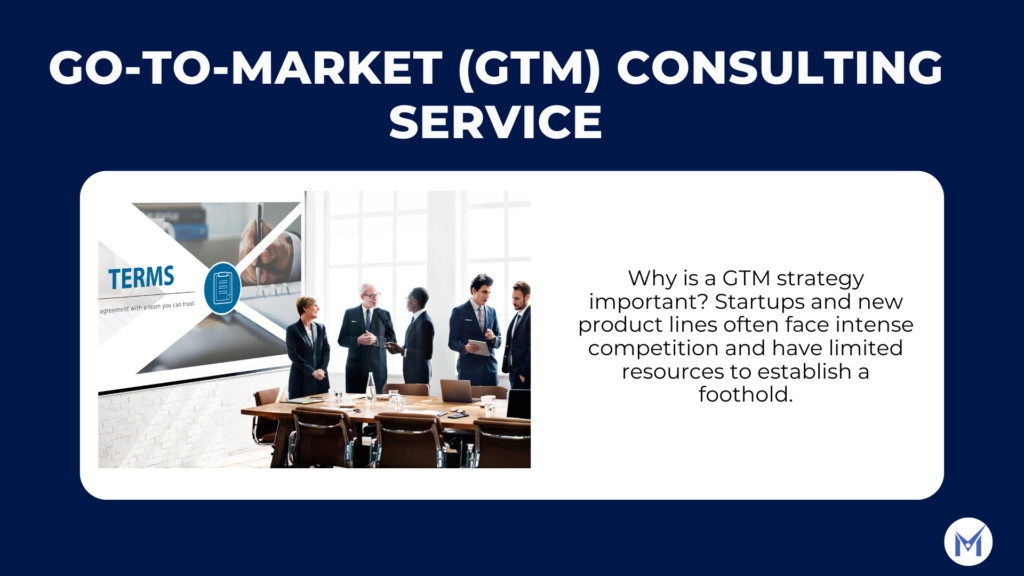
Why is a GTM strategy important? Startups and new product lines often face intense competition and have limited resources to establish a foothold. A solid GTM strategy provides a clear roadmap for how the company will navigate market challenges, differentiate itself, and convert prospects into customers. Without a GTM strategy, businesses risk wasting valuable time and money on ineffective marketing and sales efforts, ultimately hindering their ability to generate revenue and achieve sustainable growth. A successful GTM strategy aligns marketing, sales, and product teams around shared goals, allowing the company to execute a cohesive launch that accelerates market entry and enhances brand visibility.
Marketing professionals can offer GTM Consulting Services to help businesses develop and implement these crucial strategies. As a GTM consultant, you would work closely with the client to understand the product, identify target market segments, and define the value proposition that sets the product apart from competitors. This process includes conducting market research, identifying optimal distribution channels, and developing marketing and sales tactics that align with the business’s goals. Additionally, GTM consultants help businesses establish metrics for measuring launch success and provide ongoing support to optimize the strategy post-launch.
A typical GTM consulting engagement might span 6 to 8 weeks, during which the consultant collaborates with key stakeholders to refine the GTM strategy and ensure alignment with broader business objectives. The engagement begins with an in-depth assessment of the market landscape and customer needs, followed by strategy workshops to define the GTM plan. The consultant may also assist with implementation, helping the client set up marketing campaigns, coordinate with sales teams, and prepare for launch activities.
Pricing for GTM consulting services varies depending on the scope and complexity of the product or market. For startups and small to mid-sized businesses, fees typically range from $10,000 to $30,000, while larger engagements for complex products or enterprise-level launches can exceed $50,000. The deliverables for a GTM consulting service generally include:
- Market Research Report – Insights into the competitive landscape, customer needs, and key market trends that inform the GTM strategy.
- GTM Strategy Document – A comprehensive plan detailing the target audience, value proposition, marketing tactics, sales strategy, distribution channels, and pricing model.
- Marketing and Sales Alignment Plan – A roadmap for aligning marketing and sales teams, including lead generation tactics, sales enablement materials, and messaging frameworks.
- Launch Timeline and Budget – A detailed timeline for executing the GTM strategy, along with a budget allocation for marketing and sales activities.
- Performance Metrics and KPIs – A set of measurable indicators to track the success of the launch and identify areas for improvement.
By offering Go-to-Market Consulting Services, marketing professionals enable businesses to navigate the complexities of launching a new product with confidence. This service is particularly valuable for startups that need to make a strong market entry and establish brand recognition quickly. With a well-defined GTM strategy, businesses can optimize their launch efforts, reach their ideal customers, and achieve faster time-to-market. For consultants, providing GTM services offers an opportunity to deliver high-impact guidance and establish themselves as trusted partners in their clients’ growth journeys.
Marketing Strategy Development
Marketing Strategy is the foundation of any successful marketing effort. A marketing strategy outlines a business’s approach to reaching its target audience, communicating its value proposition, and achieving specific goals. It serves as a roadmap, guiding all marketing activities and ensuring they are aligned with the company’s overall objectives.
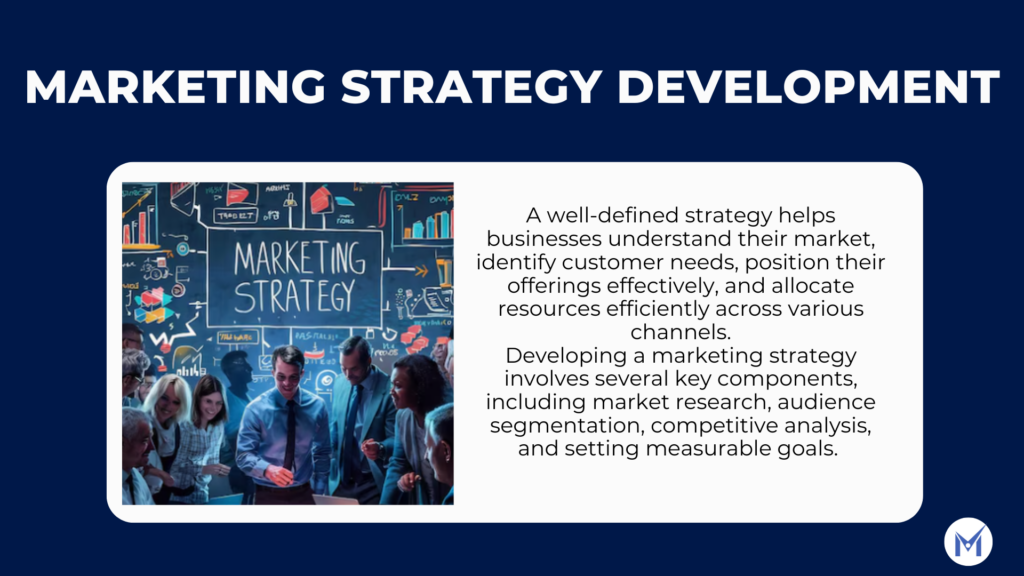
A well-defined strategy helps businesses understand their market, identify customer needs, position their offerings effectively, and allocate resources efficiently across various channels.
Developing a marketing strategy involves several key components, including market research, audience segmentation, competitive analysis, and setting measurable goals.
It also requires selecting the right mix of marketing channels—such as digital, traditional, or experiential—based on where the target audience is most active. By having a clear strategy in place, businesses can optimize their efforts, reduce wasted resources, and maximize their return on investment.
Marketing Strategy Development consulting involves helping businesses create a long-term plan that aligns their marketing efforts with business objectives. This service is highly sought after by companies looking to refine their messaging, improve market positioning, and maximize ROI on their marketing spend.
For instance, Nike redefined its marketing strategy to focus on inclusivity and social impact, it helped the brand connect with a broader audience while remaining true to its core values.
A Marketing Strategy Development Service could be offered over a 4 to 6-week period, with fees ranging from $8,000 to $20,000 depending on the scope. Deliverables might include a comprehensive marketing plan, audience segmentation analysis, and a detailed roadmap for execution. By offering this service, marketing consultants help businesses define clear marketing goals and create a pathway for achieving them.
Marketing Plan Development
A marketing plan is a detailed plan of implementing the marketing strategy defined in the earlier step. While often used interchangeably, a marketing strategy and a marketing plan serve distinct purposes within the marketing process. A marketing strategy is the overarching approach that defines a business’s goals, target audience, positioning, and competitive advantage. It answers the why and what behind the marketing efforts—why a company is targeting certain customers and what value it offers them.
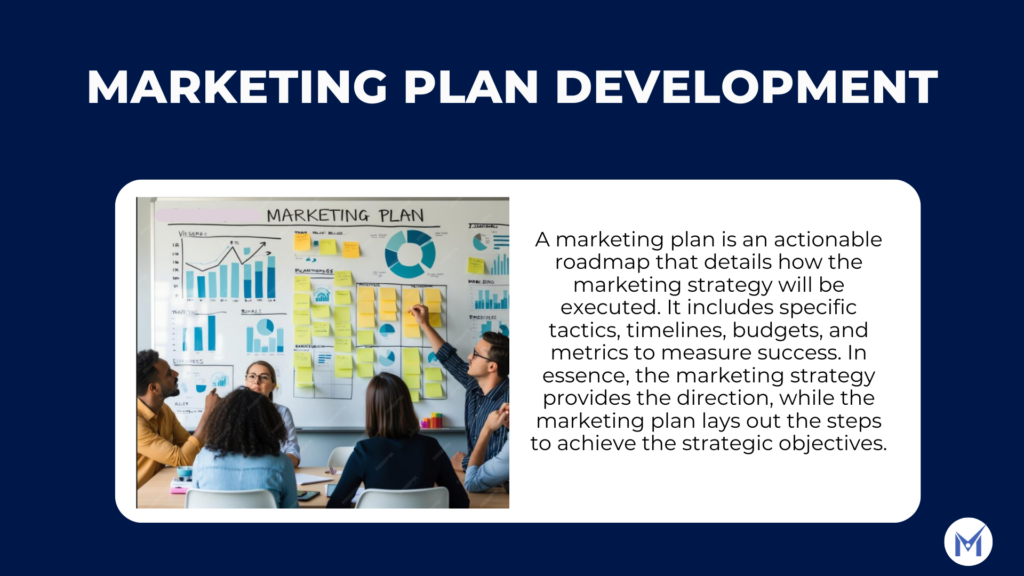
On the other hand, a marketing plan is an actionable roadmap that details how the marketing strategy will be executed. It includes specific tactics, timelines, budgets, and metrics to measure success. In essence, the marketing strategy provides the direction, while the marketing plan lays out the steps to achieve the strategic objectives.
A marketing plan outlines the strategies and tactics to be used, such as content marketing, social media campaigns, email marketing, or paid advertising, and allocates budget accordingly. Finally, the plan defines KPIs and metrics for tracking performance, such as website traffic, conversion rates, or customer acquisition costs.
Marketing professionals are well-positioned to offer Marketing Plan Development as a consulting service because businesses often struggle with creating cohesive and actionable plans that deliver results.
Many small to mid-sized companies, startups, and even larger organizations can benefit from the expertise of a marketing consultant to design a tailored plan that meets their unique needs. As a consultant, you can help companies move from reactive, short-term campaigns to a long-term, strategic marketing approach.
For example, a retail business looking to expand its e-commerce presence might hire a consultant to develop a marketing plan that outlines specific online marketing strategies, identifies target customer segments, and allocates budget for paid search and social media ads. Similarly, a tech startup might seek help creating a marketing plan focused on building brand awareness and generating leads through content marketing, influencer partnerships, and product launches.
Typical service pricing for marketing plan development can range from $5,000 to $20,000, depending on the size and complexity of the business, industry, and specific goals. The timeline for completing a marketing plan usually spans 4 to 6 weeks, during which the consultant works closely with the client to gather information, conduct research, and develop a detailed plan.
The deliverables of a marketing plan consulting service typically include:
- competitors, and market trends.
- SWOT Analysis – A breakdown of the company’s strengths, weaknesses, opportunities, and threats in the market.
- Marketing Objectives and KPIs – Clearly defined marketing goals aligned with business objectives, along with key performance indicators for tracking progress.
- Marketing Strategy and Tactics – A comprehensive strategy detailing the marketing channels to be used (e.g., digital, traditional, or experiential), along with specific tactics for each channel.
- Budget Allocation – A financial plan outlining how resources will be allocated across different marketing activities.
- Implementation Timeline – A timeline for executing the marketing plan, with key milestones and deadlines.
- Performance Measurement Plan – Tools and metrics for tracking the success of the marketing efforts and making adjustments as needed.
By offering Marketing Plan Development as a consulting service, marketing professionals can provide businesses with a strategic, data-driven approach to achieving their goals.
Branding as a Consulting Service
Branding is the process of creating a unique identity and image for a company, product, or service in the minds of consumers.
It encompasses everything from a business’s logo, colors, and visual elements to its messaging, tone, and overall perception in the market. A strong brand helps differentiate a company from its competitors, build customer trust, and create an emotional connection with the target audience.
For businesses, effective branding is crucial not only for attracting customers, but also for fostering loyalty and long-term relationships, which ultimately drive business growth and profitability.
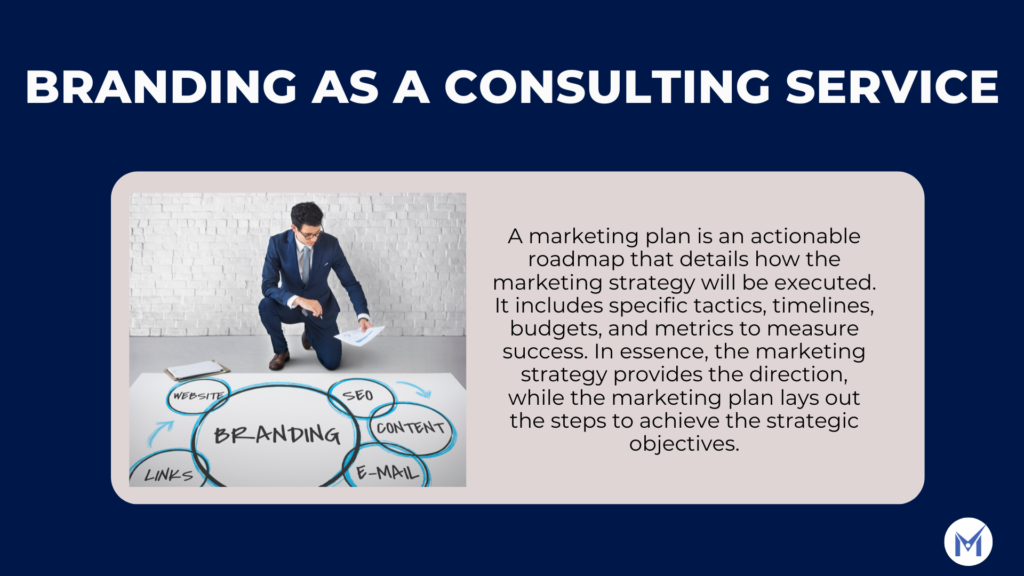
Why is branding important? In today’s competitive landscape, businesses need more than just a great product or service—they need to stand out and resonate with their customers.
A well-defined brand provides clarity about what the company represents, what it offers, and why it matters to the consumer. Strong brands like Apple, Nike, and Coca-Cola have built identities that are instantly recognizable and deeply trusted, allowing them to maintain market leadership over time.
Marketing professionals are uniquely equipped to offer branding consulting services to companies that need help developing or refining their brand identity. As a branding consultant, you would work with businesses to understand their vision, values, and goals, and then translate these into a clear, compelling brand that resonates with their target audience.
This process typically includes developing a brand strategy, visual identity (logo, color schemes, typography), brand messaging, and tone of voice. Additionally, branding consultants can help businesses ensure that their branding is consistently represented across all marketing channels, including digital platforms, print media, and customer interactions.
A typical branding consulting engagement may span 6 to 8 weeks, depending on the complexity of the project. Pricing for branding consulting services can vary based on the scope of the work and the size of the business. For small to mid-sized businesses, branding projects might range from $10,000 to $30,000, while for larger enterprises or full rebranding initiatives, costs could exceed $50,000.
The deliverables for a branding consulting service typically include:
- Brand Strategy – A clear outline of the company’s brand values, vision, and mission, as well as a positioning statement and value proposition.
- Visual Identity – A cohesive design system, including logo design, color palette, typography, and visual guidelines for all brand assets.
- Brand Messaging – Key messaging frameworks, taglines, and tone of voice that communicate the brand’s personality and value to the target audience.
- Brand Guidelines – A comprehensive document that outlines how the brand should be used consistently across all platforms, including digital and print media, ensuring uniformity in all brand communications.
- Implementation Plan – A roadmap for rolling out the new or refreshed brand across the company’s marketing channels, customer touchpoints, and internal communications.
By offering Branding as a Consulting Service, marketing professionals can provide immense value to businesses seeking to build or enhance their brand identity.
Marketing Automation Consulting
Marketing automation has transformed how businesses manage their campaigns, engage with leads, and nurture customers. Marketing Automation Consulting services are designed to help businesses implement and optimize automation platforms like HubSpot, Marketo, or Mailchimp to streamline their marketing efforts. By automating repetitive tasks like email campaigns, lead nurturing, and social media posting, businesses can save time and improve efficiency.
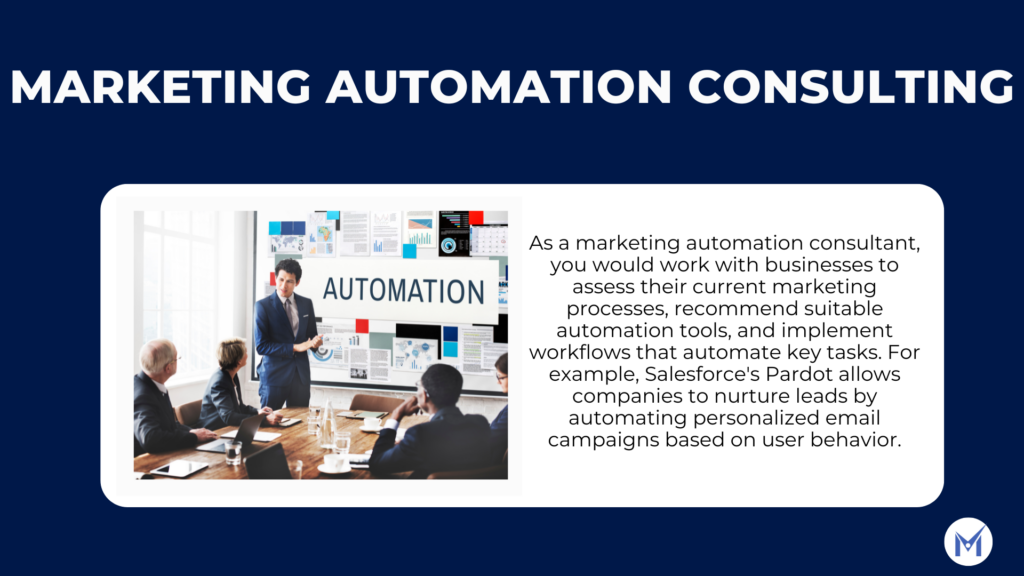
As a marketing automation consultant, you would work with businesses to assess their current marketing processes, recommend suitable automation tools, and implement workflows that automate key tasks. For example, Salesforce’s Pardot allows companies to nurture leads by automating personalized email campaigns based on user behavior. A consultant offering this service would help businesses set up lead scoring, segment customer lists, and create automated workflows that drive engagement.
A Marketing Automation Service could involve a 3 to 4-week setup and optimization period, with fees ranging from $7,000 to $15,000. Deliverables would include the implementation of automation tools, workflow creation, and reporting metrics to measure success. This service ensures that businesses can efficiently manage their marketing campaigns while focusing on high-value activities.
Lead Generation and Conversion Optimization
One of the most valuable services a marketing consultant can offer is Lead Generation and Conversion Optimization. This service focuses on attracting high-quality leads and optimizing the conversion process to turn those leads into customers. As a consultant, you can help businesses improve their lead generation strategies by refining landing pages, optimizing forms, and implementing A/B testing to maximize conversion rates.
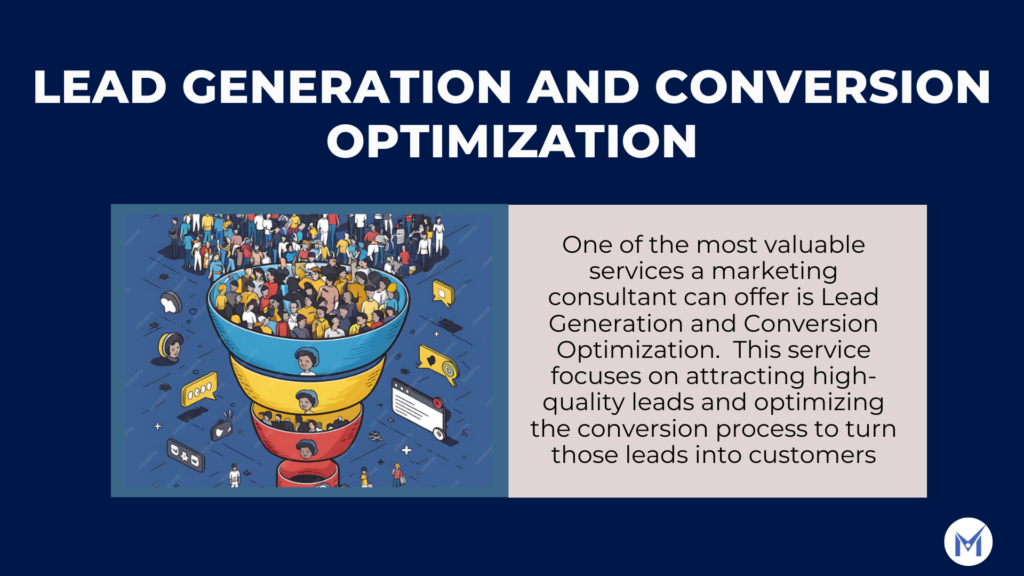
For example, by optimizing its landing pages and checkout process, Shopify increased conversion rates, leading to higher customer acquisition. As a lead generation consultant, you would work with businesses to create compelling offers, improve website performance, and develop personalized marketing campaigns that drive leads through the sales funnel.
A Lead Generation and Conversion Optimization Service might involve a 4 to 6-week engagement, with fees ranging from $8,000 to $20,000. Deliverables would include lead generation campaigns, landing page optimization, and tracking metrics to measure conversions. This service helps businesses increase the efficiency of their marketing efforts and improve their return on investment.
Content Marketing Strategy Consulting
In today’s digital landscape, Content Marketing has become an essential tool for driving customer engagement and building brand authority. As a Content Marketing Consultant, you can help businesses craft strategies that leverage blogs, videos, infographics, social media, and more to attract and engage their target audience. Content marketing focuses on creating valuable, relevant content that addresses the needs and pain points of potential customers, ultimately driving conversions.
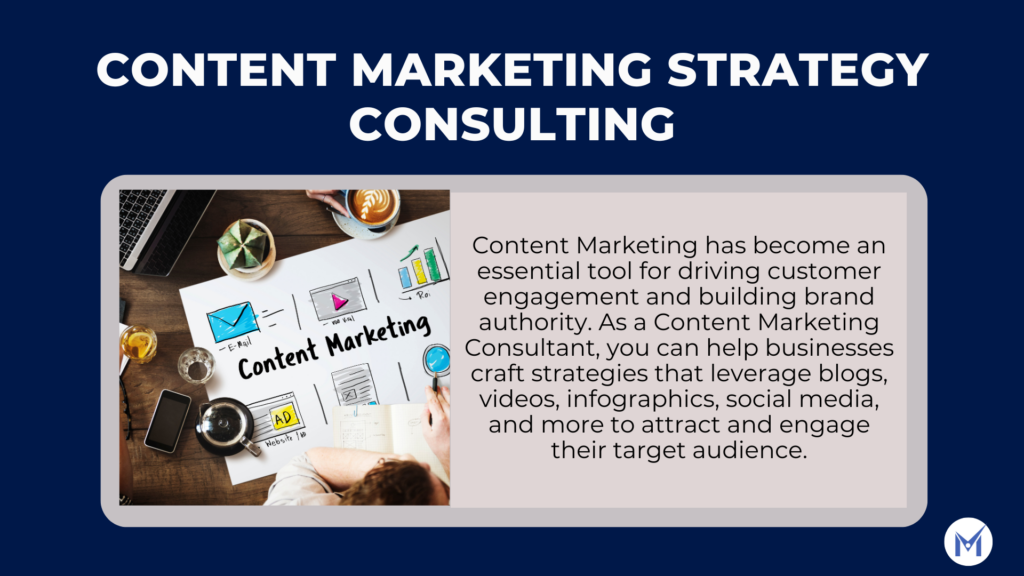
A consultant can work with clients to develop a content calendar, identify content pillars, and implement a distribution plan across multiple channels. For example, HubSpot is widely known for its content marketing strategy, which provides educational materials, templates, and how-to guides that help attract and retain customers. Similarly, you can assist companies in building content that educates, informs, and positions them as thought leaders in their industry.
A Content Marketing Consulting Service might involve working with clients for 4 to 6 weeks, with fees ranging from $6,000 to $15,000. Deliverables could include a comprehensive content calendar, content creation guidelines, and distribution strategies for social media, blogs, and email campaigns. Offering content marketing consulting helps businesses create a steady stream of valuable content, increasing customer engagement and loyalty.
Marketing Analytics as a Consulting Service
Marketing Analytics is the practice of measuring, managing, and analyzing marketing performance to maximize its effectiveness and optimize return on investment (ROI). Through marketing analytics, businesses can track the impact of their campaigns, understand customer behavior, and make data-driven decisions to improve future marketing strategies. This process involves collecting and analyzing data from various sources, such as website traffic, social media engagement, email open rates, and customer purchase patterns, to gain insights into which tactics are working and which are not. By leveraging these insights, companies can refine their strategies, allocate resources more efficiently, and ultimately drive better business results.
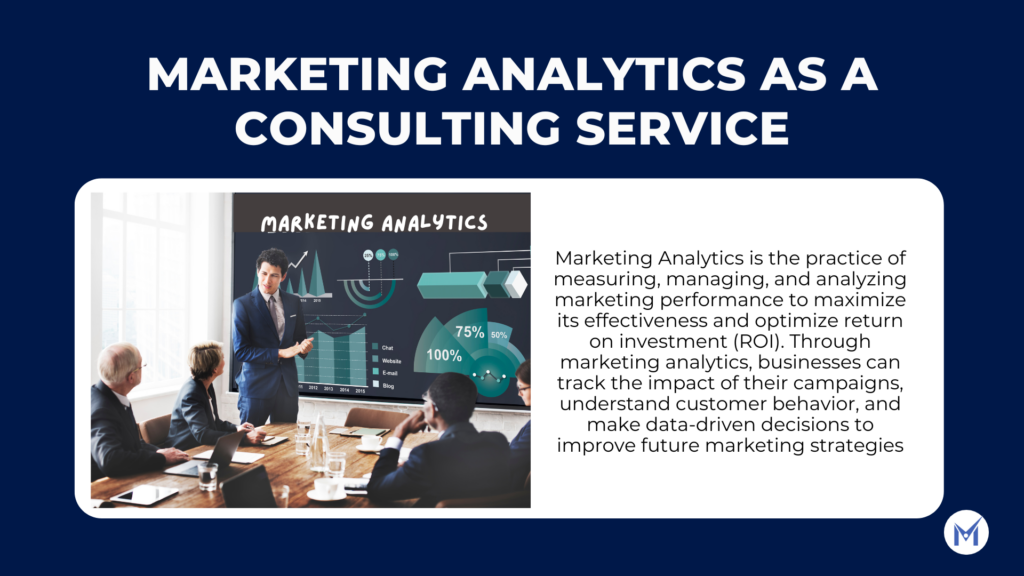
Why is marketing analytics important? In an increasingly data-driven world, marketing analytics provides businesses with the clarity and precision needed to stay competitive. Analytics helps companies identify what resonates with their customers, measure the success of different marketing channels, and understand how to optimize customer journeys. Without marketing analytics, businesses risk making decisions based on assumptions rather than actual performance data, leading to inefficiencies and missed opportunities. For companies aiming to increase their market share, improve customer retention, or optimize their marketing budget, analytics is essential for making informed and impactful decisions.
To offer Marketing Analytics as a Consulting Service, marketing professionals need a strong foundation in data analysis, statistical methods, and familiarity with analytical tools like Google Analytics, Tableau, and marketing automation platforms. Additionally, effective marketing analysts should have skills in data visualization to present insights in a clear, accessible way. Proficiency in data manipulation languages like SQL or Python can be beneficial for deeper analysis, while an understanding of digital marketing channels and customer behavior is crucial for interpreting the data accurately.
A typical engagement for marketing analytics consulting could span 4 to 6 weeks, depending on the scope of analysis and the size of the business. Consultants would start by identifying the client’s key performance indicators (KPIs) and setting up tracking systems to monitor marketing performance across various channels. The consultant might then conduct an in-depth analysis of current campaigns, customer data, and market trends to provide actionable insights and recommendations. For businesses, these insights could lead to better-targeted campaigns, optimized ad spend, and improved customer segmentation.
Pricing for marketing analytics consulting services generally ranges from $5,000 to $20,000, depending on the complexity of the analysis and the amount of data involved. Larger organizations with more extensive data may require more time and resources, which can increase costs. The deliverables for a marketing analytics consulting service typically include:
- Data Collection and Tracking Setup – Implementation of tracking tools and systems to monitor relevant marketing metrics and customer interactions.
- Performance Analysis Report – A detailed analysis of current marketing efforts, highlighting trends, customer behaviors, and campaign effectiveness.
- Dashboard and Data Visualization – Creation of customized dashboards and visual reports that allow the client to easily monitor performance metrics and track progress over time.
- Recommendations and Action Plan – Insights and strategic recommendations for optimizing marketing efforts, based on data analysis, including suggestions for budget allocation, channel optimization, and customer segmentation.
- Training and Support – Depending on the client’s needs, consultants may also offer training sessions to help internal teams use analytics tools effectively and interpret data insights.
By providing Marketing Analytics as a Consulting Service, marketing professionals can empower businesses to make data-driven decisions that lead to more effective and efficient marketing strategies. This service not only helps businesses understand the effectiveness of their current efforts but also provides a foundation for continuous improvement and innovation. For consultants, marketing analytics offers a valuable opportunity to deliver high-impact insights and establish long-term relationships with clients seeking ongoing data support and optimization.
Summary: Marketing as a Consulting Service
Marketing consulting services provide businesses with expert guidance across essential areas such as strategy development, branding, market research, and analytics. By offering specialized consulting services, marketing professionals can help companies optimize their marketing efforts, achieve better customer engagement, and drive growth. From crafting comprehensive marketing plans to implementing data-driven analytics, these services allow businesses to reach their goals more effectively while staying competitive in the market.
The benefits of marketing consulting are substantial. Businesses gain access to tailored strategies that align with their objectives, improve their brand presence, and enhance their understanding of customer behaviors. Moreover, services like Go-to-Market strategy and Customer Experience Optimization provide businesses with actionable roadmaps for launching new products or improving customer satisfaction. Marketing professionals bring an external perspective and specialized expertise that help companies make informed decisions, reduce inefficiencies, and maximize their return on investment.
Through platforms like Minutly’s service catalog, marketing consultants can showcase their services and reach potential clients effectively. By building a presence on Minutly, professionals can outline their unique offerings, attract a diverse client base, and demonstrate their impact with clear, concise service descriptions and success stories. Marketing consultants can leverage Minutly’s platform to grow their business, expand their network, and establish themselves as trusted partners in helping businesses achieve their marketing goals. With the right approach, marketing professionals can create a flexible and sustainable consulting practice that drives success for both their clients and themselves.

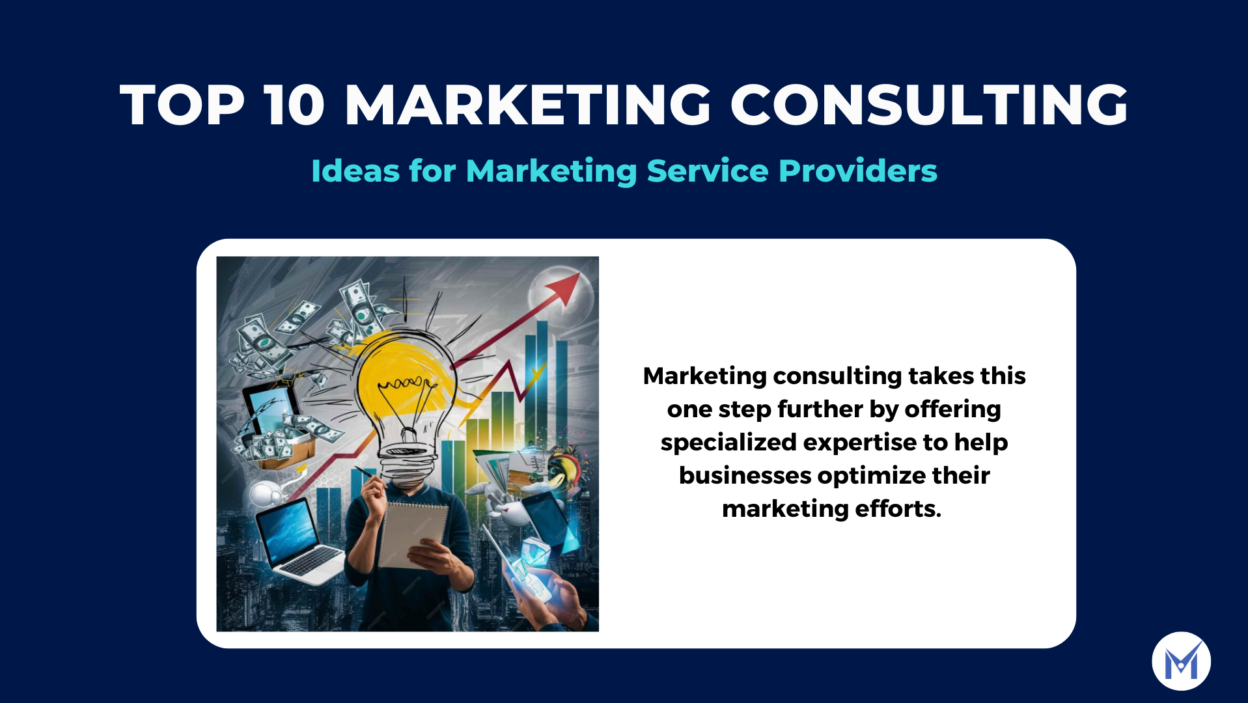


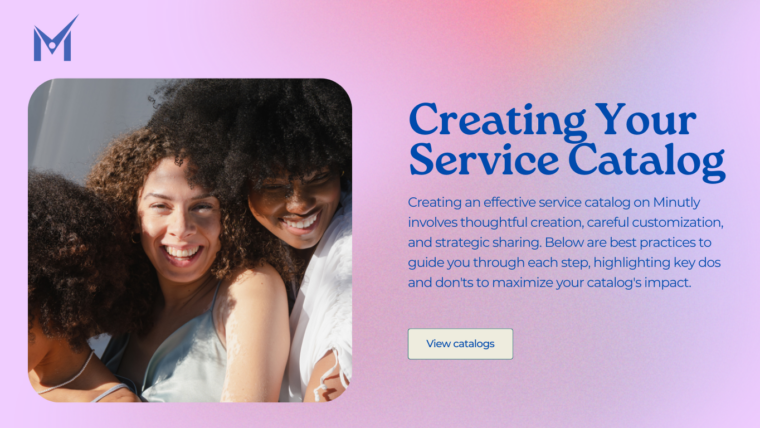
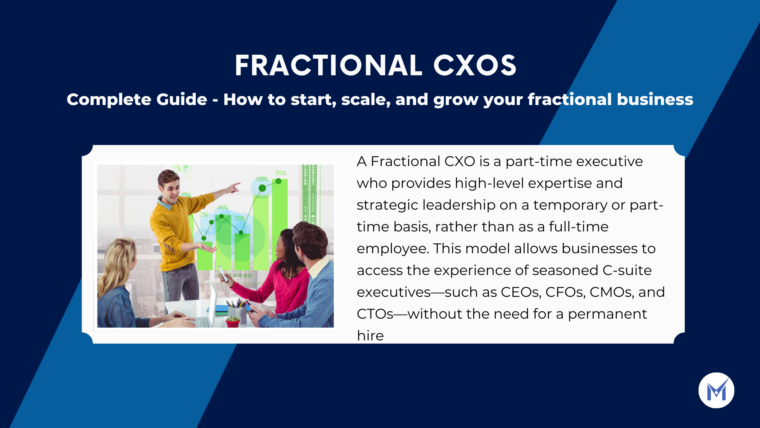
50+ Website features that makes running a business easier
How to start a Generative AI Service: A Comprehensive Guide (2024)
Marketing Automation: Subscriber List Building
Marketing Automation: Appointment Booking Automation
What is a Service Catalog?
Top 10 Essential Sales Service Requests Every Business Should Offer
Sharing your Minutly Catalog
Setting up your catalog